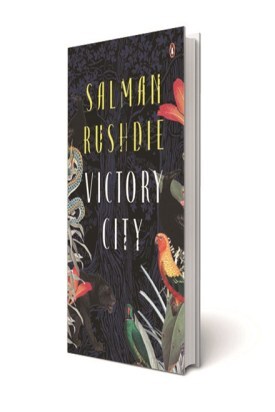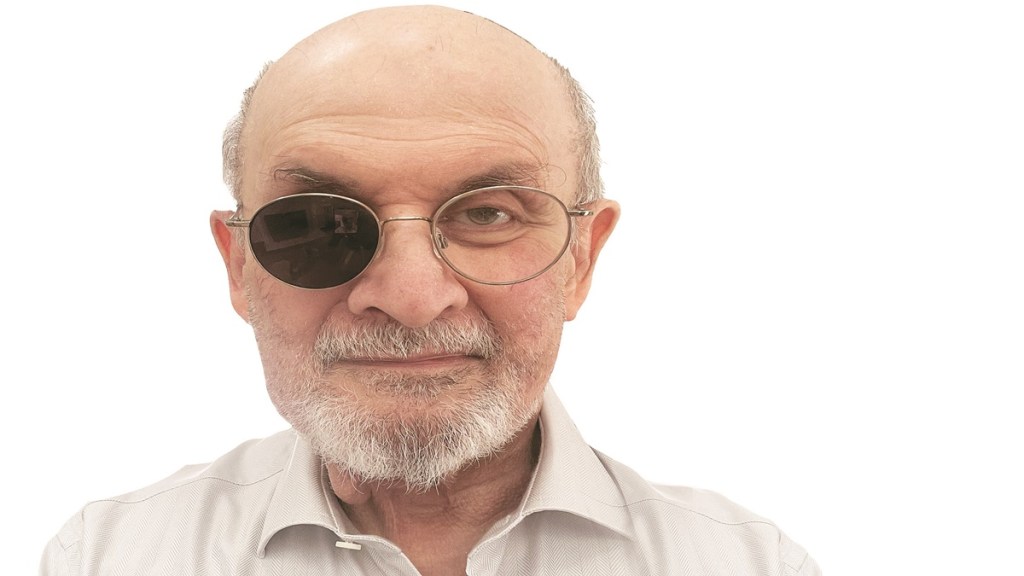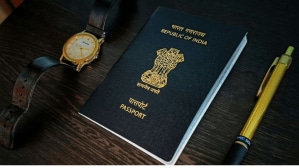In his previous book of essays, Languages of Truth (2021), Salman Rushdie wrote that “the realist tradition is doomed to a kind of endless repetitiveness”, and hence novelists “must turn to irrealism and find new ways of approaching the truth through lies”. From Midnight’s Children to Quichotte, his novelistic career can be read as a statement against realism and a search for alternative shores.
In his latest novel, Victory City, he turns to the mighty Vijayanagara empire of southern India. Like his previous novels, it blends the real with the magical. Harihara and Bukka, the two brothers who founded the empire in the 14th century, appear in the novel as Hukka and Bukka. The legendary Portuguese traveller of the Vijayanagara empire, Domingo Paes, becomes Domingo Nunes, whose mispronunciation lends the empire a new name of Bisnaga.
At the centre of the novel is the mercurial Pampa Kampana, an astute woman, a kingmaker, a storyteller who outlives several dynasts before she turns blind. The novel begins with her death at the age of 247, after having finally completed her epic poem, Jayaparajaya (Victory and Defeat), about the Bisnaga empire. Before her death she buries the text in a clay pot “as a message to the future”, only to be discovered by the unnamed narrator 450 years later.
As a girl of nine, Pampa had seen her mother Radha Kampana, along with thousands of women, immolate herself after their kingdom was decimated by invaders and the king’s head was gifted to the Delhi sultan.
Wandering in the forest, the orphan girl receives supernatural powers from the goddess Parvati “to make sure that no more women are burned in this fashion, and that men start considering women in new ways, and you will live just long enough to witness both your success and your failure, to see it all and tell its story, even though once you have finished telling it you will die immediately”.
A marvellous tale is set up in the first few pages. Pampa helps Hukka and Bukka establish the Vijayanagara kingdom, an empire which is created by ‘fiction’. Pampa chooses her characters, lends them distinct stories and the city comes alive, with women in crucial roles, from soldiers to palace guards to lawyers. Fiction is in direct contest with history here, with the author underlining that stories inform our lives in more profound ways than histories.
Pampa remains the Queen Bee through the novel. She is in love with the Portuguese traveller, but marries Hukka, and gives birth to three daughters who have fair skin, reddish hair and green eyes.
She chooses the younger brother Bukka after the elder one dies. People around her turn old and vanish but she remains ageless, the charming seductress. Like the characters of the Ramayana and the Mahabharata, she also goes to exile and spends a total of 132 years in both vanvaas and agyaatvaas, before she plots her legendary return.
But as you wade through the labyrinthine tales of multiple kings, the rise and fall of the empire, you can’t help asking: has the novelist exhausted the possibilities of magical realism? It’s a genre that believes that realism is too bland and insufficient to convey the complications of reality, as complex truths can be best expressed by weaving improbable situations. Rushdie’s aesthetic choice remains valid, but his preferred genre may also be dated. Haruki Murakami was hypnotic in his initial novels; his formal invention of creating an alternate universe stunned the readers, but the genre appeared jaded and over-utilised by the time he reached Killing Commendatore (2018).
Rushdie seems to be on a similar trail. Semi-mythical characters, their tales collapsing onto the other, which made for a spellbinding reading once, but hardly stir us now. The last three decades have seen a range of novels employing the technique, suggesting that magic realism may also be doomed to repetitiveness.
The question for both the practitioner and the connoisseur is this: what makes the novel bedazzling—myriads of tales or a profound enquiry into human existence? Be it real or irreal or surreal, the tales you carry within are those that make you pause, instances when the reader closes the book and turns pensive.
Victory City does have some persuasive instances about remembrance and time. Residents of Bisnaga had a complicated relationship with memories, perhaps because Pampa had implanted fictional histories in their genes. It lent the empire a futuristic eye, but also made it prone to multiple amnesias. Pampa could compress and expand “time for dramatic purposes” because she was “the mistress of chronology, not its servant”.
A deep proposition that, sadly, remains underdeveloped. Could it be attributed to the inherent constraint of the genre Rushdie has chosen that demands a lightning pace and doesn’t easily afford languid spaces required for a reflective prose? Compare it with Alan Lightman’s Einstein’s Dreams, a slim novel that majestically examines the various facets and velocities of time and memory in a few short chapters.

It should also be recorded that for a European and American reader, magical realism was a major textual innovation after three centuries of realistic representations. Perhaps not as much for an Indian who still lives on the shores of perennial streams of Panchatantra and Kathasaritsagar. The definition, perception and reception of magical realism, hence, becomes contextual.
Also read: Delay in catching symptoms of epileptic seizures in children can lead to life-long disabilities
The novel ends with a stunning authorial declaration—“All that remains is this city of words. Words are the only victors.” But what to make of words that seem devoid of spirit? You may not want to enter Victory City if you have lived in superior kingdoms.
Ashutosh Bhardwaj is a writer and journalist
Victory City
Salman Rushdie
Penguin Random House
Pp 352, Rs 699









